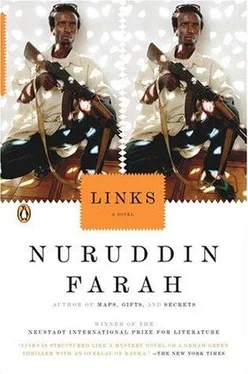Jeebleh joined the others, and the battlewagon took them back to Bile’s apartment. He was more pleased with himself and more relaxed than he had felt for a long time. But there was no Shanta in the apartment. Instead, he was pleasantly startled to find Faahiye in the living room. Where were Raasta and Makka? They were in Bile’s room, asleep, where Bile was awake, staring at the ceiling.
MEANWHILE, FAAHIYE WAS PERFORMING A RELIGIOUS RITUAL. HE TUCKED HIS sleeves up past his elbows, washed his hands several times, flung the water with his right hand into his mouth, and rinsed his mouth three times. Then he snuffed the water into his nostrils, only to blow it out soon after by closing his nose with the thumb and forefinger of his left hand and snorting. He washed his face three times, then his right hand and arm, and rubbed his wet right hand over the top of his head. He inserted the tips of his forefingers into his ears and turned them around and around, then passed his thumbs upward, behind his ears. He washed his neck with the back of his fingers, and finally, washed his feet up to his ankles, pressing his fingers into the spaces between his toes, one space at a time.
Jeebleh and Seamus watched as Faahiye repeated the ritual of ablution again and again, never failing to recite the appropriate traditions.
“It’s as though he has fed his mind on an insane root, which has taken his reason prisoner,” Seamus whispered.
“As if a little water will clear him of the deed!”
Jeebleh left, intending to call at Shanta’s to make certain that everything was in order for the next day’s alla-bari feast.
“But let us go; Cain with his thorns already
is at the border of both hemispheres….
Last night the moon was at its full.”
. . Meanwhile we journeyed.
(CANTO XX)
DANTE, Inferno

THAT NIGHT EVERYONE APPEARED TROUBLED AND ANXIOUS, FOR OBVIOUS and not so obvious reasons.
Jeebleh cast his mind back on everything that had happened, perhaps to sort out what memories to take with him to New York. Could this be why he had stashed away the letter the clan elders had left for him? His intention was to frame it, and put it on his office wall. His hand kept going to his thigh, where the muscleman had injected him. He continued to wonder if his contagion of worry would kill him before he had even had his blood tested at home; he was worried less about the barber’s cut, now that it was healing.
He called New York, telling his wife and daughters in an edited fashion what had happened. He touched only briefly on Caloosha’s death and his burial, and did not even mention Af-Laawe. He would explain things better once he was back in the safety of home. He concentrated instead on the commemoration of his mother — the construction of the sepulcher, the symbolic reburial, and the upcoming alla-bari feast. He told his wife that he was changing his return date, and would let her know about it. Feeling guilty about not offering a complete and true version of things, he laid it on thick when he stressed how much he had missed them all, and how eager he was to return to the bosom of his loving family.
At last Bile came out of his room, where the light was now on. Jeebleh took the slight grimace on his face as a smile, but Bile remained silent. He seemed, however, to be in a cheerier mood than Jeebleh had expected. Perhaps the antidepressants, if that is what they were, had helped him emerge.
As for Faahiye, the poor fellow kept performing a ritual of his own invention, putting his index fingers in his ears and turning them around and around, as if his ears were filled to bursting with wax. Choosing not to raise the devil, because she knew no one would tolerate it, Shanta went to him and spoke solicitously. There was an opaqueness at the center of Faahiye’s insanity, as perhaps there was at the heart of Bile’s.
Shanta was the one to break the silence, to tell Raasta and Makka that they would be going home early, for they had a busy day ahead of them. As they left, Faahiye leaned against Shanta for support; Makka leaned on Raasta, as though for affirmation. It was a most humbling lesson in compassion.
Where was Seamus? Jeebleh had no idea, nor did anyone else. But this didn’t bother him, convinced as he was that Seamus was engaged in an activity worthy of a reliable friend.
WHEN SEAMUS RETURNED LATER THAT NIGHT, SILENT AND EXPLAINING nothing, Jeebleh shuttled between The Refuge — now turned over to several imams chanting the Koran — and the apartment, where his secular friends were camped, barely speaking to each other.
The imams were reciting the entire Holy Scripture, each with his own assigned chapters. At one point, Jeebleh listened to the head imam interpreting a verse for the benefit of his younger colleagues. The imam alluded to a remark ascribed to the prophet Mohammed, about sedition. And perhaps in order to throw more light on the situation in Somalia, the learned scholar paraphrased the Prophet’s words: “Cursed with the hearts of the devil in their bodies, some of the ‘leaders’ will inevitably veer from the virtuous path into iniquity.”
Feeling sufficiently instructed, Jeebleh walked out into the starry night to take a closer look at the cow that would be slaughtered the next day. Humbled by the sight, he stood before the heifer as though meaning to communicate with her. Jeebleh thought again about his belated attempt to make peace with his mother in the act of reclaiming her. How he wished he could send her a message and have the sacrificial beast before which he was standing deliver it. In subdued sorrow, unable to give flesh to his idea, he returned to the apartment.
On his way there, it struck him that madness was a country to which many people he knew in Mogadiscio had paid visits. He prayed that neither he nor any one of his friends would suffer permanent damage.
The apartment was quieter than when he had left it. Seamus’s door was open, but his room was empty of him. Bile’s door was open too, and he was there. Jeebleh wondered where Seamus might have gone, but said nothing to Bile, having no wish to bother him. Then he stretched out on his bed, fully dressed, thinking about what remained to be done. No, he was not ready to abandon himself to sleep.
JEEBLEH WAS UP AND ON HIS FEET SHORTLY, STANDING SHAKILY ON THE wrong side of forty winks, still so exhausted his knees were about to buckle under him. The morning hadn’t yet dawned, and he had on the same clothes as yesterday.
He was a changed man. He wasn’t quite on cloud nine yet, but he was on his way — aiming at it, hoping for the chance. He had opened a parenthesis with his decision to visit Mogadiscio on a whim, to elude death at the same time that he reclaimed his mother, whom he had neglected into an early grave. Now the parenthesis seemed to be closing, but he felt that it wouldn’t have served his purpose for that to happen just yet. After all, he was not prepared to dwell in pronominal confusion, which was where he had been headed. He had to find which pronoun might bring his story to a profitable end.
It was too early to assess the changes that the visit had wrought on his character. Presumably his general personality would be unaltered. No doubt, something in him had given here and there, the way fabric stretches. But the basics remained, gathered at the corners, perhaps sagging or giving at the seams, where the stitching might be faulty. Fancy living in an open parenthesis for as long as Jeebleh had lived in his.
His eyes were no longer drooping with bags of insomnia. Nor was he as harried as he had been the day before, when he went back and forth between the apartment and The Refuge. Granted, it would’ve been easy for him to kill, just as it would’ve been easy to die at someone else’s hands, in a city where death was treated like an acquaintance. He remembered his exchanges with Seamus on the related topic of burial. How Seamus lamented that in Mogadiscio they buried you quickly; how he found the idea of being buried, no questions asked and no postmortem, so troublesome; how it irked him that no one inquired what someone had died of, and that, at the mention of a name now forever linked to death, people sought refuge in the phrase “the will of Allah,” as if this were the alias of the deceased. Seamus would probably want people to have the facts, to know how Caloosha had died, at whose hands, and why. Because he did not wish to play a part in a cover-up, Jeebleh thought it wise to leave before he was tempted to speak of what bothered him.
Читать дальше













